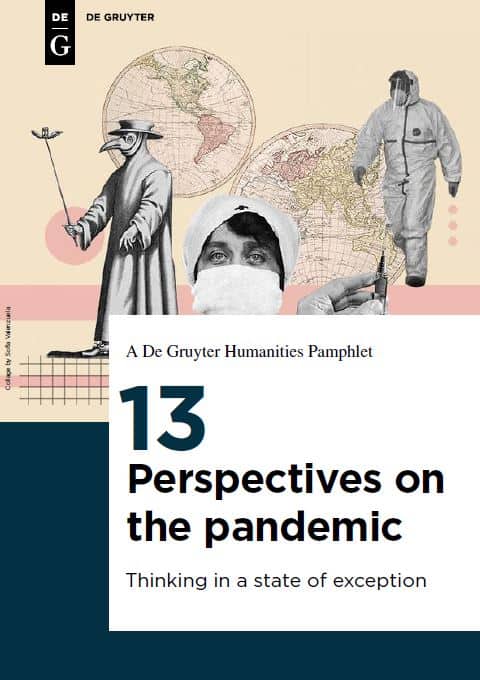W.G. Sebald and the Natural History of Covid-19
The writer and academic W.G. Sebald (1944–2001) is considered one of the most important literary voices of the late 20th century. Less widely known is the pessimistic philosophy of history that underwrites his books: what might Sebald have said about Covid-19?
This essay was first published in the free digital pamphlet 13 Perspectives on
the Pandemic: Thinking in a state of exception.
People have been asking me lately what Sebald might have thought about the Covid-19 pandemic. How would I know? People ask because I knew him well and have published several books on his writings.
But they also ask because Sebald was a highly original thinker, whose idiosyncratic views often deviated from the left-liberal opinions of most academics. For instance, he did not share the precept that the Holocaust was a unique disaster in the history of civilisation. Rather, Sebald considered the genocide as a particularly horrid chapter in what he called the “Natural History of Destruction.”
Pessimistic Critique of Civilisation
The first point Sebald probably would have made is that the pandemic, allegedly originating at a “wet market” for animals, relates to the fact that we eat animals. He was a vegetarian who felt a close, creaturely solidarity with animals and repeatedly drew analogies between abattoirs and concentration camps.
Carnivorism, to him, was emblematic of our destructive, reckless attitude towards other living beings, and to nature itself. Sebald perceived humankind as an evolutionary aberration that thrives on killing and destruction, ultimately exterminating itself by destroying its world.
He did not share the belief that we humans are the masters of our own fate, or that our ability to think enables us to free ourselves from nature. Far from it. In Sebald’s mind, all the great disasters in the history of the last three hundred years — be they wars, genocides, the destruction caused by industrialization, natural or man-made disasters like the pandemic — were epiphenomena of the natural history of destruction.
Grünewald and Benjamin
Sebald, like the painter Grünewald he portrayed in After Nature, “tended towards an extremist view of the world” in which “our insane presence on the surface of the earth” results predominantly in suffering and misery, while history develops “in downward orbits.”
Naturally, Sebald’s pessimistic critique of civilisation provokes counter-arguments, and rightly so. But rather than being dismissed wholesale as nihilistic, Sebald’s pessimism should stimulate critical thinking. It encapsulates the bleak insight of philosopher Walter Benjamin that history is catastrophe in permanence. And right now we get quite a vivid sense of what this means.
Covid-19 Changes The Scene
Sebald would have told us that Covid-19 is only a symptom of the wider crisis that we need to address, namely the need to free ourselves from the shackles of the natural history of destruction.
He would probably argue that the pandemic will act as an agent of accelerated destruction on various levels. Some of these are already easy to foresee: an increase of nationalist, populist politics; the proliferation of fake news on social media; massive economic damage leading to spending cuts in areas such as culture and education; an intensification of the shift in world politics from Western democracies and European countries to rising autocratic powers like China.
“Sebald would have told us that Covid-19 is only a symptom of the wider crisis that we need to address.”
Closer to home, Sebald — who was an outspoken critic of the way in which Margaret Thatcher and her successors destroyed academic freedom through neoliberal reform policies — would have observed how Covid-19 lays bare the cracks that run through British society: the marketisation of healthcare leading to probably the highest death toll in Europe; social inequality resulting in over proportional casualties among ethnic minorities.
The coronavirus crisis will serve as a smokescreen for the Tory government to push through its final Brexit policies— and blame the inevitable repercussions on Covid-19. Bleak times lie ahead, in particular for the university sector. The crisis has already stymied the vital strike action against pension cuts, unfair pay and increased casualisation in UK higher education. And with international students likely to avoid studying in the UK for some time, the resulting financial shortfall universities are likely to face will hit humanities and languages departments hardest.
A Better Post-Coronavirus World?
The post-coronavirus world, optimists claim, may be better in some respects. For instance, the upsurge of video conferencing may result in more people being able to work from home and less international travel for business meetings.
Sebald, however, would strongly disagree. To stick with the example, he would see increased digitalisation as yet another leap towards the fourth industrial revolution in which artificial intelligence will inaugurate the final victory of the machine — with severe negative repercussions for human society.
Divided Futures and Waiting Miracles
Is Sebald’s vision of the future too bleak? Maybe, but given the situation as it presents itself, optimism may actually be a form of denial. What can hardly be denied, though, is that the Covid-19 crisis amounts to a watershed: from now on, things will change, for better or worse.
Being pessimistic amounts to being prepared. After all, Sebald stated in an interview in 1996 that “despite all foreseeable catastrophes, we still have to assume that the future is divided; that there may be miracles around the next corner that we did not expect.”
Learn more in this related title from De Gruyter
[Title image: private]
